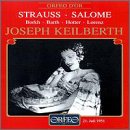| All Artists: Hans Hotter, Richard [1] Strauss, Joseph Keilberth, Irmgard Barth, Katja Sabo, Munich Bavarian State Orchestra, Inge Borkh, Lorenz Fehenberger, Max Lorenz, Albrecht Peter, Gertrud Ebeling, Karl Hoppe, Karl Ostertag, Max Proebstl, Rudolf Wunzer, Walter Carnuth Title: Strauss: Salome Members Wishing: 0 Total Copies: 0 Label: Orfeo D'or Release Date: 12/12/1995 Genre: Classical Styles: Opera & Classical Vocal, Historical Periods, Modern, 20th, & 21st Century Number of Discs: 2 SwapaCD Credits: 2 UPC: 750582879029 |
Search - Hans Hotter, Richard [1] Strauss, Joseph Keilberth :: Strauss: Salome
 | Hans Hotter, Richard [1] Strauss, Joseph Keilberth Strauss: Salome Genre: Classical
|
Larger Image |
CD Details |
CD ReviewsA Borkh To Remember 01/01/2004 (5 out of 5 stars) "Inge Borkh was a dramatic soprano of great power and charisma, but most of her recordings reveal a pronounced wobble. This Salome is a revelation, because it brings us her voice before the wobble took hold. It's young, steady and beautiful, and unlike any other Borkh recording I know.For that alone it's worth buying, but Max Lorenz's Herod and Hans Hotter's Jokanaan guarantee competition for dramatic laurels on this hot night in Munich.You won't forget this one in a hurry." The weirdest Salome I've ever heard, and it's great. Pekinman | Illinois | 01/10/2010 (5 out of 5 stars) "Inge Borkh is one of the more fascinating dramatic sopranos of the 20th century; Salome is one of the strangest scores ever composed in the operatic repertory; the combination of these two things makes for a highly disturbing experience, as it should be in this opera.
Borkh's Salome is a vicious, wheedling, spoiled monster from her very first utterance. At no moment do you feel sympathy for this horrible adolescent. The opera, in this case, has become about the over-powering sexual awakening of a headstrong, indulged and decadent teen-aged girl looking for religious epiphany in all the wrong places. Borkh often sacrifices tonal beauty (which she possesses in abundance when she chooses) and utilizes a nasal, piercing whine to spit out the more recitativo passages. She and Max Lorenz (Herodes) both employ near sprech-stimme to convey the extremities of their characters' reactions to one another. When the music gets really wild and fragmented both these singers descend into vocal dementia but never to the point of distorting the musical line or going over the top histrionically, but they get close. The strangeness of the score is accentuated by the sound quality of this release. It was recorded live at the Munich Festival in July of 1951. It takes a few seconds to adjust the ears away from expecting the usual clear fidelity and immediacy of current technology. The orchestra sound is clear but comparatively thin, as if the listener were hearing it as the singers would hear it coming up out of the pit. It isn't an anemic sound however. It blossoms and roars when needs be but in the more sparsely scored sections certain instruments stand out vividly in contrast to the general rumbling and grumbling going on around them. Instruments like the xylophone, timpani, cymbals and notably the horns stand out in high relief making for some odd sounds never noticed before but right there in the score. Joseph Keilberth is one of the great Salome conductors as it turns out. I don't regret the limited dynamics in this case because the resulting whole is so eerie and makes my skin crawl over and over again as the situation worsens towards the end of the opera, ie Salome's getting more and more pyschotic leading up to her necrophilic ecstasy. Hans Hotter's St John is just as dangerous as Borkh's Salome, and their scene together at the beginning is psychologically gruesome. The supporting cast is excellent whether they are singers you've ever encountered before or not. Inge Borkh is not an acquired taste, as some seem to think she is. Her huge voice possessed a strong, fast vibrato but it was never a wobbler in my experience of her on record. It could be argued that she had a judder (the steady vibrato) but it doesn't detract from the overall sensuousness of her singing, unlike Eva Marton whose juddering became almost like hiccups lined up in a row. Borkh's top notes gleam like titanium, and her middle and low voice, though more course than her top notes, are secure and easily penetrate the orchestra in its wildest rages. I forgot I was listening to a live performance, there was only one tiny cough noted from a silent (stunned) audience. It was more like witnessing a personal domestic meltdown that I wasn't supposed to see. It was only when the audience erupts in roars at the end that I was pulled back from the tormented and private nightmare that had just played itself out. If you think Salome is one of the great masterpieces of the opera repertory (which it is) and are interested in Inge Borkh, Max Lorenz and Hans Hotter in these roles (and this is the only recording of any of them in these parts that I know of) then you will need to have this recording in your Salome library. If you love great threater this is a vivid memento of a great performance at Salzburg almost 60 years ago." |

 Track Listings (5) - Disc #1
Track Listings (5) - Disc #1